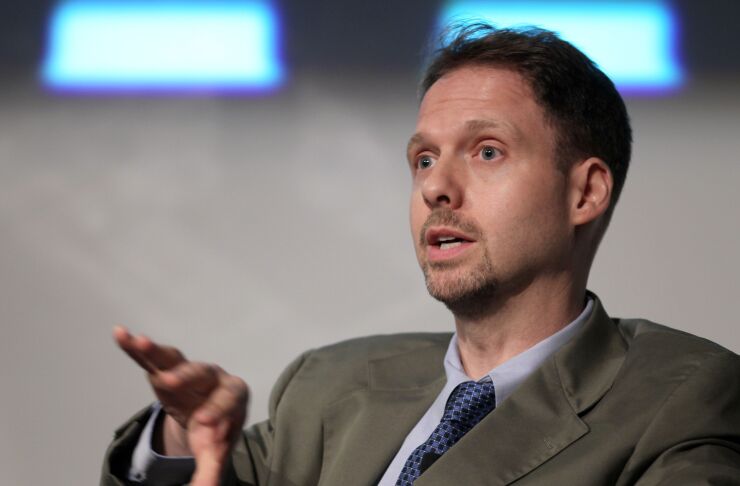Observers and participants in the yearslong effort to turn around Puerto Rico’s economy offered mixed opinions about the significance of the
Skeel will leave the board after a successor is approved. He has been on the board since it was founded in August 2016.
Bloomberg News
“I’ll miss both David’s leadership and his friendship over the years that we have served on the Oversight Board,” board member Andrew Biggs said. “The board will evolve as its membership does, but David’s hard work has left the board positioned for continuing success in the future.”
“As a Puerto Rican, I would like to thank Mr. Skeel for eight years of commitment,” Advantage Business Consulting President Vicente Feliciano. “As we emerge from bankruptcy, the board has been, on balance, a positive force.”
The Puerto Rico Oversight, Management, and Economic Stability Act’s “municipal bankruptcy provisions and, more importantly, novel quasi-federal trusteeship of local government finance through a non-elected board of overseers has been tested in the courts and the crucible of the local political process,” said Phillip Escoriaza, senior counsel at Feldesman Leifer. ”This system has reached institutionalization, for better or worse, and I would not expect major change with turnover at the top.”
Skeel may be frustrated, said University of Puerto Rico President José Garriga Pico, “for not having been able to instill a culture of fiscal responsibility despite having put in place strong measures to curb spending and [having tried] to reform local government administration.”
Still, some were critical. “Happy to wish farewell to Skeel,” said Antonio Fernós Sagebien, professor at Interamerican University of Puerto Rico. “Hopefully he will take some time off to reflect and see that he did not advance Puerto Rico’s priorities during his tenure at the board.”
“David Skeel never intended to follow the direction Congress
She opposed his “novel theories of bankruptcy law” and criticized Skeel’s “huge effort to bring down the legal underpinnings of municipal revenue bonds.
“His legacy in the municipal market won’t be positive, in my opinion,” Long said.
In response, the board said, “David Skeel’s record speaks for itself.”
When the board was established, it said, “Puerto Rico was at the verge of fiscal collapse; the Oversight Board successfully restructured the unpayable commonwealth debt to sustainable levels.” The board also noted while the Puerto Rico government ran deficits for 16 years before PROMESA was enacted, “in the eight years since the Oversight Board was created, government spending has not exceeded revenue. Prof. Skeel made sure the Oversight Board firmly stayed on the path to fulfill PROMESA’s mandate.”
Quoting Skeel’s comment Wednesday, the board reiterated, “Puerto Rico today is better off than in 2016, and that is what matters.”
As for President Biden’s appointment of Luis Ubiñas to the board, Fernós Sagebien said, “His business background should help gain some ‘sense of urgency’ on [the board]’s behalf. Looks that the board wants to perpetuate themselves and the Puerto Rico political class are unable to learn from their mistakes.”
UPR’s Garriga Pico said, his experience suggests “a more liberal outlook compared to the stern disciplinarian Skeel. Yet, I wonder how his outlook will impact the [board]´s norms and operations; or if it will ultimately benefit Puerto Rico or walk back whatever we may have advanced in fiscal responsibility.
“I hope he steers the [board] to focus more on the joint goals of economic development and increased productivity in both the public and private sectors,” Garriga Pico said. “For too long we have overlooked that the best way out of the fiscal crisis is by making the economy grow.”
The board said it was unsure if Ubiñas’ appointment was to replace Skeel or to fill the current vacancy on the board. The White House did not immediately respond.
As for the future of the Oversight Board, Fernós Sagebien said, “One thing is clear to me: misaligned priorities from stakeholders and policymakers as the people of Puerto Rico are not in the number one spot.”
Former board member Justin Peterson said, “Americans should not be ruled by an unelected board. It’s time for Congress to disband the [board] and return power to Puerto Rico’s elected officials.”
In other Puerto Rico news, on Wednesday the Oversight Board, Puerto Rico’s Fiscal Agency and Financial Advisory Authority, and the Unsecured Creditors Committee for the Puerto Rico Electric Power Authority petitioned the First Circuit Court of Appeals for a rehearing on its three-judge panel’s decision, issued earlier this month, that largely sided against the board on the PREPA bondholder’s lien on revenues.
The board asked the judges to rehear the issues. FAFAA and the Unsecured Creditors Committee asked the court to have either a panel rehearing or a rehearing en banc, in which all the court’s judges would consider the case. The court is not obligated to grant either rehearing.
